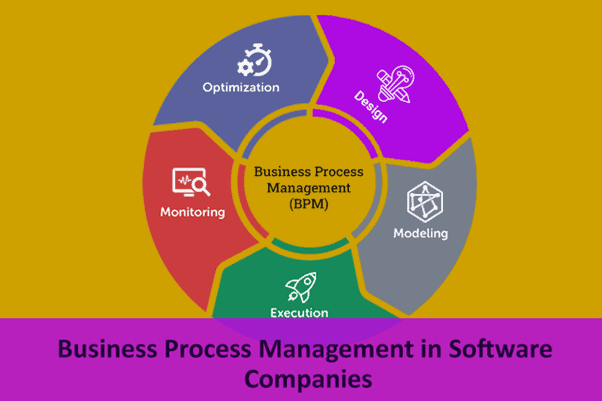Business Process Management (BPM) is a term that describes various methodologies to manage business processes efficiently. BPM is a discipline that provides a systematic approach to managing and optimizing a company’s corporate performance. If that does not make sense, simply think of a model that focuses on improving core business processes through the analysis of things that may work best for the company. The goal of having a proper BPM tool is to optimize, automate (where possible) processes that are repetitive in nature, for example, approval and verification of documents, projects, and any operational tasks.
Business Process Management in software companies is more inclined towards the software development life cycle methodologies. The core processes happening inside any software company involves processes related to planning, creating, testing, and deploying applications.
Why is BPM Important?
BPM was used to achieve cost-saving and productivity gains in the past. Now, it has evolved to focus on services to customers. Software development methodologies also used to focus more on cost-saving and productivity; however, now, ideas have changed. BPM is an important way for companies to manage overall functionalities. The stress on creating better customer experience has inspired companies to adopt BPM practices and acquire software tools to do the same.

How Can you get Started with Business Process Management?
There are only 3 ways to get started with BPM. First, you need to identify the business challenge and its value. Organizations first need to understand their goals and strategy that deliver the greatest return on investment. Secondly, you develop process improvement skills, and once that is done, then you can start adopting BPM practices across the enterprise. In order to begin your BPM journey, your attention should lean towards delivering value to the business and with small, yet effective measures prove competency with one project, and then extend the ideas to other business processes.
What are the Core Processes in Software Development?
As mentioned above, software development starts with planning and analysis of the requirements. The follow-up steps include documenting the requirements and the timeline in a structured format. Once the documentation is ready, the design and prototyping of the application take place, followed by the actual development process. Testing and Deployment are important steps that either go along with the development cycle or happen at the end of every module completion.
How is BPM and Software Development Related?
Software Engineering is a field that has been with us for quite a time, whereas standards for BPM are more recent. The advancement in software development has been an inspiration for many BPM methodologies. BPM tools have advanced a lot and with them comes many features that help in automating the decision-making processes and also use analytics on the go.
If you imagine a chemical company using a BPM tool, they too follow similar development lifecycle methodologies. However, compared to the software industry, the processes they follow are more rigid, and only revolutionary breakthroughs change them with time.
However, software industries are different; their business processes change every time there is a new BPM tool or effective software development life cycle (SDLC) methodology in the industry. The software industry changes rapidly compared to others, and it is the breakthroughs in this industry that actually change the face of other industries. The point is communities can continue to profit from observing and adapting developments from the other side.

What Features does BPM Software Provide?
- Modeling Tools
Depiction of business processes with the help of flow charts makes it intuitive for teams to understand complex business workflows. A Business Process Modelling Tool helps in creating graphic models of forms and processes. Modern BPM tools allow users to design custom processes without coding.
- Data Management
The data revolution has already begun, and BPM tools cannot overlook features that include capturing data and analyzing them for better reporting on dashboards. Advanced BPM tools also have features that can leverage modern business intelligence software that is specifically used for data analytics. The line between such tools is blurring, and one cannot distinguish the difference between them.
- Collaboration Features
Business Process Management tools also have features that allow the sharing of documents, chat options, and provide interfaces that allow discussion of certain workflows. Anybody familiar with the use case of social media can easily get along with these socializing features.
- Real-Time Analysis and Key Performance Indicators
The performance of business processes is measured using KPIs. This involves the analysis of past and present performance. Using these tools, operations managers can make decisions to widen bottlenecks in business processes.
- Access Control
BPM tools allow administrators to restrict access to certain sections/ interfaces to certain people. This ensures the protection of sensitive information. Almost all BPM tools come with this feature out of the box.
- Mobile Support and Process Performance Metrics
SmartPhones are pretty common these days, and therefore you can find BPM tools with mobile support easily. PPM is a tool that is used by organizations to spot issues with a process and make valuable decisions to better them.

Business Process Management Software
- Appian
Appian’s BPM suite allows users to create custom processes. It comes with features that allow users to model processes, apply business rules, track them, and adapt to events based on market demands.
- Agile Point
AgilePoint is a BPM software that can be used by technical as well as non-technical users to build responsive business applications. They have a low to no code feature that helps in automating processes across the entire organization.
- Oracle Business Process Management
Similar to other BPM tools, Oracle Business Process Management (OBPM) also comes packed with tools for creating, executing, and optimizing business processes. OBPM collaborates with business, and IT practices to automate the business processes.
- IBM Business Process Management
IBM’s Business Process Management tool is a complex platform that gives insights to manage business processes for any domain, be it software or others. The principle on which IBM’s BPM platform is based on is delivering business value.
Although BPM tools are quite bulky, they lack a few recent trends in the software industry. CI/CD tools need to be integrated in modern BPM tools as they are a part of the software development life cycle. BPM tools of the future will be influenced by artificial intelligence (AI) and modern analytics. Since the front end and back end development are generally done in isolation, BPM tools need to come up with a different approach to manage these processes for better efficiency in development. The BPM vendors that will lead the market would be those who incorporate current and future technological trends into their system.
Summary:
BPM for Software Companies
Business Process Management (BPM) is a term that describes various methodologies to manage business processes efficiently. BPM is a discipline that provides a systematic approach to managing and optimizing a company’s corporate performance. BPM was used to achieve cost-saving and productivity gains in the past. Now, it has evolved to focus on services to customers. However, software industries are different; their business processes change every time there is a new BPM tool or effective software development life cycle (SDLC) methodology in the industry. The software industry changes rapidly compared to others, and it is the breakthroughs in this industry that actually change the face of other industries. Features: Modeling Tools, Data Management, Collaboration Features. Real-Time Analysis and KPIs, Access Control, Mobile Support, Process Performance Metrics.
